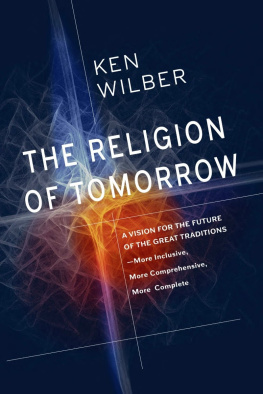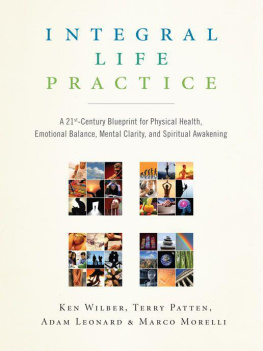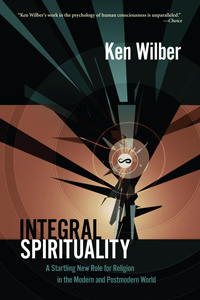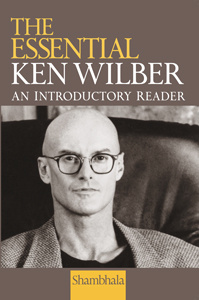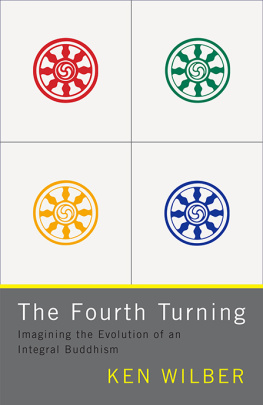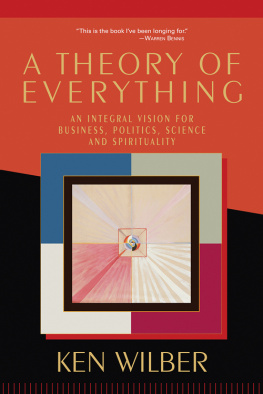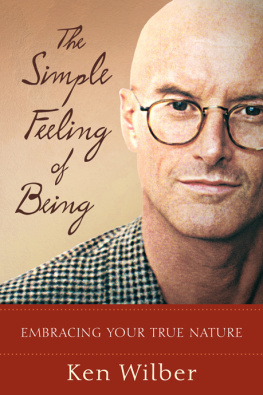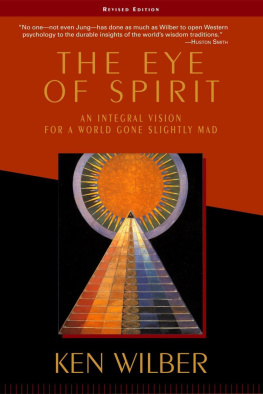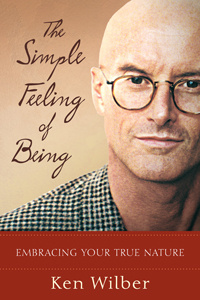Selected Books by Ken Wilber
A Brief History of Everything
Integral Life Practice
Integral Meditation
Integral Spirituality
The Integral Vision
The Simple Feeling of Being
A Theory of Everything
Shambhala Publications, Inc.
4720 Walnut Street
Boulder, Colorado 80301
www.shambhala.com
2017 by Ken Wilber
All rights reserved. No part of this book may be reproduced in any form or by any means, electronic or mechanical, including photocopying, recording, or by any information storage and retrieval system, without permission in writing from the publisher.
eBook design adapted from printed book design by Greta D. Sibley
Cover design by Jim Zaccaria
Cover art: Masterfile Royalty-Free
Library of Congress Cataloging-in-Publication Data
Names: Wilber, Ken, author.
Title: The religion of tomorrow: a vision for the future of the great traditionsmore inclusive, more comprehensive, more complete / Ken Wilber.
Description: First Edition. | Boulder: Shambhala, 2017. |
Includes bibliographical references and index. Identifiers: LCCN 2016017248 | ISBN 9781611803006 (hardcover: alk. paper)
eISBN 9780834840744
Subjects: LCSH: ReligionPhilosophy. |
ReligionHistory21st century. | Buddhism.
Classification: LCC BL51 .W5863 2017 | DDC 200.1/12dc23
LC record available at https://lccn.loc.gov/2016017248
v4.1
a
Contents
Introduction
This is a book about what a possible religion of tomorrow might look like. It is meant to apply across the field of the Great Traditions; I believe that all of them will, in fact, most likely end up incorporating many of these elements into their own fundamental teachings at some point, simply because the forces driving toward such are so varied and far-reaching and, on balance, indeed make such a great deal of sense.
Nonetheless, in this particular presentation, I have chosen one religionthat of Buddhismto use as a concrete instance, because specifics need to be given as actual examples of what is directly involved, and that requires a real religion to use as an example. I am not suggesting that Buddhism is somehow superior or more advanced and thus more open to this (in fact, as only one example, there are already a dozen books in print using exactly the same framework I will be introducing here to create a similarly futuristic Christianity). So there is no particular bias involved here; I believe any of the Great Traditions could be used as examples, and versions of many of them (including Christianity, Islam, Hinduism, and Judaism, as well as Buddhism) have already been presented following the same suggestions made in this book to show what would be involved in their own cases, with each of them indeed appearing to end up much more inclusive, complete, and comprehensive (not to mention fitting more easily with modern and postmodern developments, including those of basic science, without violating any of their main teachings).
So if you hail from a different faithor if you are yourself spiritual but not religiousplease work with me in the following pages and see how these suggestions could apply to your own spiritual path, formally or informally, and see if they dont help address many problems that your approach may be facing in todays world. Just see if the suggestions Im about to offer dont make a certain basic sense to you in many, many ways.
But we start with Buddhism. It has been close to three thousand years since Gautama Buddha sat under the Bodhi tree and arose with his Enlightenment, which marked the First Great Turning of the Wheel of Dharma (ultimate Truth); some eighteen hundred years since Nagarjuna and his genius birthed the Emptiness realization and the Second Great Turning; and some sixteen hundred years since the half brothers Asanga and Vasubandhu made the Third (and final) Turning of the Wheel of Dharma with the refinement of the Yogachara view. And even looking at the wondrous developments of Tantra, especially as pioneered in the great Nalanda University in India from the eighth to the eleventh centuries CE , it has been close to a thousand years since something profoundly new has been added to Buddha Dharma.
The worlds other Great Traditions find themselves in not much different circumstances, most of them being anywhere from one to three thousand years old. At the time that the major texts in all of these Great Traditions were first written, people really did think the earth was flat and was circled by the sun; slavery was taken to be the natural state of affairs, the way things were supposed to be (and this was challenged by none of the traditions); women were second-class citizens, if even that; atoms and molecules were unknown; DNA was unheard of; and evolution crossed nobodys mind.
And yet the worlds great contemplative and meditative systemsEast and Westlooked into the minds, hearts, and souls of men and women and came up with staggeringly astonishing discoveries, many as timelessly true and profoundly significant today as they were two thousand years ago. After World War Two, Jean-Paul Sartre was touring Stalingrad, scene of an epic battle between the Russians and the Germans, where the Russiansfinally, and barelydefeated the Germans, at the cost of millions dead. They were amazing, Sartre mumbled under his breath. The Russians? his aide asked. No, the Germans, that they got this far.
Thats the only appropriate sentiment you can take toward these great adepts and ancient sagesthat thousands of years ago, they got this far; they saw into the core of human beings and discovered, virtually each and every one of them, the ultimate Ground of Being, not only of humans but of the entire manifest universe. With no telescopes, microscopes, MRIs, or PET scans, they saw into the very essence of an ultimate reality that not only anchored all of manifestation but, when discovered, acted to radically free men and women from suffering itself, and introduce them to their own True Nature, known by many different names, but pointing to the same groundless GroundBuddha-nature, Brahman, Godhead, Ayn Sof, Allah, Tao, Ati, Great Perfection, the One, Satchitananda, to name but a few.
Most of these traditions divided their teachings into two broad areas, often called exoteric and esoteric. The exoteric was the outer teaching, meant for the masses and the ordinary, and consisted of a series of tales, usually in mythic form, and it was taught that those who believed them would live everlastingly in a heaven with that traditions ultimate Being or God or Goddess. But the esoteric teachings were the inner teachings, the secret teachings, usually kept from the public and open only to individuals of exceptional quality and character. These teachings werent merely mythic stories and beliefs; they were psychotechnologies of consciousness transformation. By performing the specific practices and exercises, an individual could reach an actual awakening to his or her own True Nature, gaining a Great Liberation and ultimate Freedom from the terror-inducing limitations of ordinary life and a direct introduction to ultimate Reality itself. This Great Liberation was also known by various namesEnlightenment, Awakening, moksha, kensho, satori, metamorphosis, emancipation, salvation. In all cases, it was said to be the discovery of the timeless and eternal, spaceless and infinite, Unborn and Undying, Unlimited and Unfettered, the one and only One and Only, ultimate Reality itself. As Arthur Machens fictional character Hampole so truthfully put it, of these esoteric practices:

